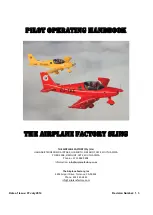
Glue the servos/IDS frame in using epoxy. If the epoxy is thin it is possible to add
some thixotropy agent. It is also possible to use Cyano glue in small amounts
Install the threads and clevises whilst the servo arms are set 90 degrees on the
servos and the ailerons / flaps are set in neutral position. When using
thread/clevis secure the thread to the clevis with extra thin CA as this is a place
with some slop. Check also thoroughly the clevis pins going into the horns and
servo arms. There are clevises that can be poorly made in this special detail. Use
the inner most hole on the servoarms possible to ensure full power of the servo
yet providing full throw.
On ailerons it is possible to use a simple bent 1,5mm pushrod with the
servorahmen setup.
Install and glue with Cyano the connector holders in tips and midsection. It can
also be glued with epoxy or polyurethane glue. We do not recommend heat glue.
Start with one side and the other side as the tip are inserted. This ensures perfect
fit and connection each time. There is a small wire connector supplied for each
tip/servo bay. Be careful not getting Cyano into the connector metal parts.
It is recommended to install clear tape on the ends of the wings. This will prevent
the paint being ripped off when the tape is applied / removed every time you go
flying
Adjust the aileron throw according to the settings sheet below.
Meassure the throws from neutral on the inner part of the surfaces
Adjust the aileron throw on flaps
Adjust the crow brake flaps to as much as possible (70-85 degrees is good)
Adjust the crowbrake on ailerons to 1mm up (no bending while brakes applied)
Camber for thermal is +1-5mm measured on flaps and equal along the whole
trailing edge
Camber/reflex for distance/speed is -1 and -2 mm
Snap flap (elevator – flap mix) can be used up to 5mm on full elevator throw
Cut the servo covers so the fit and secure them with tape
IDS installation on youtube
Part 1
https://www.youtube.com/watch?v=f1HJjbIv5uE
Part 2
https://www.youtube.com/watch?v=GtK9itGYJsM
Tip servo installation on youtube by Flightcomp:
https://youtu.be/j8pwiXLxQBM
Midsection installation on youtube by Flightcomp:
https://youtu.be/-UN7GagaiYA
Assembling the fuselage:
After installation the nose cone back part can be shortened by up to 105mm to
adjust the CG. All depending on motor/propeller/ESC/battery used.
Use a Dremel tool to open the servo bay where the servo horn is coming down to
the pushrod. Also make holes for servo wires and wing harness. Make the holes so
that wires does not go into the bottom of the fuse. The bottom of the fuse needs
the space for the ballast rod
Install the “fuse to wing”-harness in the fuselage. Roughen the green connector
and fuselage fitting before you glue it
Install the receiver in the slot under the wing. Drill holes backwards so that the
antenna comes out without making a sharp bend. The antennas (2.4) should
come out behind the wing on each side (min 2-4cm behind). A range test will
show that your installation is correct. A third (or the second) antenna can be
under slightly under the wing and straight down but careful on ballast position. Be
also very careful on not drilling into the pushrods.
Mount elevator and rudder and secure in neutral with some tape. Shorten the rod
for correct length by marking the total length to servo horn with a pen and then
pull forward thru opening for cutting. The coupler can be glued to the carbon rod
with Cyano and for safety pinch the coupler with a plier to ensure tight fit. Check
the connection thoroughly
Adjust the elevator so that it is in neutral checking top and bottom airfoil (trailing
edge 24mm from fuse). Full throw is 15mm up and 17mm down. At full crow the
elevator goes down to approximately 11mm depending on crow settings for wing.
It is good to ensure more down throw (+6mm) possible after crow brake is set
Summary of Contents for Prestige 2PK
Page 4: ......






















